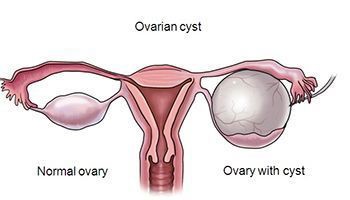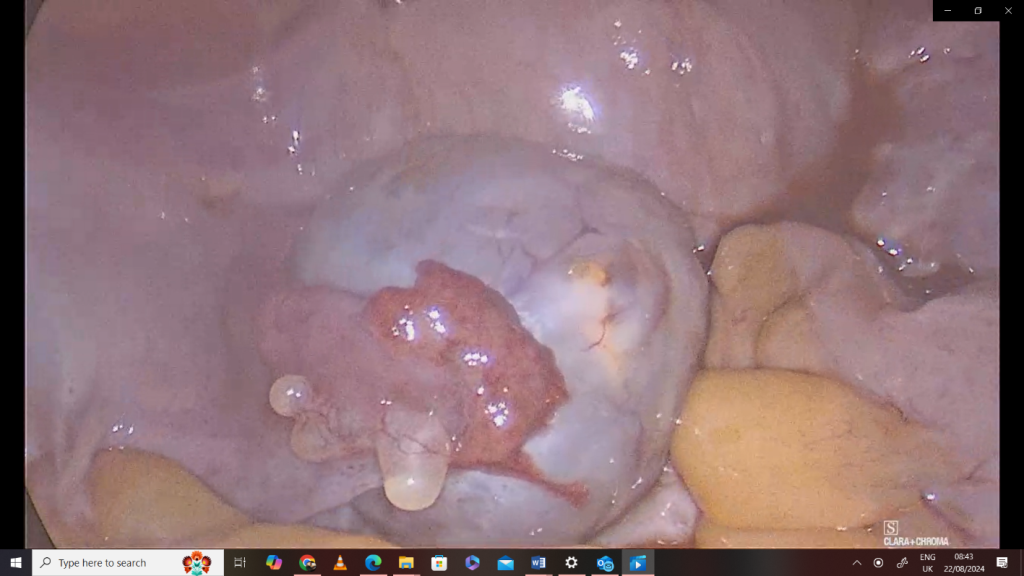Ovarian cysts are sacs that are full with fluid in or on the ovary. There are variety of cysts that occur on the female organ. They are harmless and therefore have no symptoms.

The ovarian cysts can disappear in few months. If they persist, the cysts can cause complications. Here are more about the cysts, symptoms, treatment and specialist that can help you handle with the condition.
What are ovarian cysts?
An ovarian cyst is a fluid-filled collection found in the ovary (looks like a balloon filled with fluid). Ovarian cysts can occur at any age though they are more common among women of reproductive age, between 18 and 50 years. The older one is the higher likelihood the cyst is of a sinister origin i.e. those above 50 yrs
It may occur as a single cyst or several cysts together.
Most cysts are non-cancerous. However, a few may be cancerous. Therefore, assessment by your gynaecologist is important.
How does one get them?
There are many causes of ovarian cysts.
Some cysts develop as part of the normal menstrual cycle (functional cysts). These are harmless and often disappear on their own.
Other cysts may be associated with:
- Endometriosis
- Poor dieting-which leads to hormonal imbalance then cyst formation
- Polycystic ovarian syndrome
- Use of fertility medication (ovulation induction medication)
- The hormonal contraceptives for example the depo Provera and the implants are associated also in some ladies.
- Non-cancerous growths on the ovary such as dermoid cysts
- Rarely, they may be cancerous cysts
What are the ovarian cysts common symptoms?

Majority have no symptoms at all.
However, a number may present with the following symptoms:
- Lower abdominal discomfort
- Lower abdominal pain. It may be worse during intercourse or movement
- Swelling of the abdomen if the cyst is large. At times the cysts may be so large that people may think you’re pregnant.
- Nausea, vomiting and severe lower abdominal pain are seen when the ovary twists
- Hormonal imbalance symptoms like irregular menses and abnormal skin changes like acne and overgrowth of hair, beards and hairy hands etc.
How are ovarian cysts diagnosed?
During a check-up, your gynaecologist will take a detailed medical history and do a thorough abdominal examination.
Additionally, they will do an ultrasound scan to see if there are cysts, how many they are, their size and how they look like.
Other tests may be done, depending on the results of the scan. These tests include pelvic MRI, and a chemical test known as CA 125 that should show chances of the cyst being cancerous.
Ovarian cyst treatment: how does Velvet Women Clinic them?
- Waiting- If the cysts are too small and have no symptoms. However, you need to be checked every 6-8 weeks by your gynaecologists to see if the cysts are growing bigger or smaller in size.
- Birth control pills- These prevent more cysts from developing.
- Injection of medication that starve the cysts of hormones and thus they shrink.
- Draining the cysts via ultrasound. Risk of recurrence is higher with this method however.
- Surgery- This is done for larger cysts especially more than 5 cm. Larger cysts have a higher risk of causing the ovary to twist around (ovarian torsion) causing even more pain.
Either laparoscopic surgery or open surgery can be done to remove the cyst. The choice of surgery depends on the size of the cyst. Though in velvet clinic 95% of the cysts we encounter are removed laparoscopically due to the team experience.
Frequently asked questions about ovarian cysts in Kenya
What is the most common treatment for ovarian cysts? Surgery is one of the commons ways of treating ovarian cysts.
What does an ovarian cyst pain feel like? It ranges from dull, heavy sensation to severe and sharp pain.
What is the main cause of ovarian cysts? They form as a result of the menstrual cycle.
When should I be worried about an ovarian cyst? If they cause severe pain and can hardly go away.
What is the best medicine for an ovarian cyst? There is no specific recommended medication, but our ob/gyns advise you to visit our clinic or any other medical specialist close to you.
Can I get pregnant with an ovarian cyst? You can become pregnant with cysts, but it become a bit for you to get pregnant.
What size of ovarian cyst is dangerous? If it is over 5 centimeters and should be removed by a specialist.
What causes ovarian cysts in young females? They develop following normal body processes or change in the sex hormones.
Generally ovarian cysts are not dangerous and can be monitored and rarely associated with cancer. Contact our ob/gyns specialist for help.
